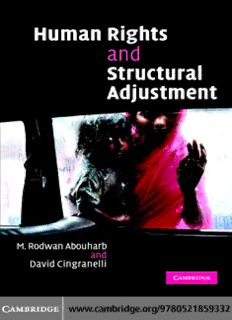
Human Rights and Structural Adjustment PDF
Preview Human Rights and Structural Adjustment
This page intentionally left blank Human Rights and Structural Adjustment “Structural adjustment” has been a central part of the development strategyforthe“thirdworld.”LoansmadebytheWorldBankandthe IMF have been conditional on developing countries pursuing rapid economic liberalization programs as it was believed this would strengthentheireconomiesinthelongrun.M.RodwanAbouharband David Cingranelli argue that, conversely, structural adjustment agreementsusuallycauseincreasedhardshipforthepoor,greatercivil conflict,andmorerepressionofhumanrights,thereforeresultingina lower rate of economic development. Greater exposure to structural adjustment has increased the prevalence of anti government protests, riots, and rebellion. It has led to less respect for economic and social rights,physicalintegrityrights,andworkerrights,butmorerespectfor democratic rights. Based on these findings, the authors recommend a humanrights based approach toeconomic development. m. rodwan abouharb isanAssistantProfessorofPoliticalScience atLouisianaStateUniversity.Hisresearchexamineshumanrightsand civil andinternational conflict. david cingranelli is a Professor of Political Science at Binghamton University, SUNY, co director of the CIRI Human Rights Data Project, and former President of the Human Rights Sectionof theAmerican Political Science Association. Human Rights and Structural Adjustment M. Rodwan Abouharb and David Cingranelli CAMBRIDGE UNIVERSITY PRESS Cambridge, New York, Melbourne, Madrid, Cape Town, Singapore, São Paulo Cambridge University Press The Edinburgh Building, Cambridge CB2 8RU, UK Published in the United States of America by Cambridge University Press, New York www.cambridge.org Information on this title: www.cambridge.org/9780521859332 © M. Rodwan Abouharb and David Cingranelli 2007 This publication is in copyright. Subject to statutory exception and to the provision of relevant collective licensing agreements, no reproduction of any part may take place without the written permission of Cambridge University Press. First published in print format 2007 ISBN-13 978-0-511-46329-7 eBook (EBL) ISBN-13 978-0-521-85933-2 hardback Cambridge University Press has no responsibility for the persistence or accuracy of urls for external or third-party internet websites referred to in this publication, and does not guarantee that any content on such websites is, or will remain, accurate or appropriate. This book is dedicated to Margaret Elizabeth Barker and Therese Cingranelli Contents List of figures page ix List of tables x Acknowledgments xiii Part I: The argument 1 1 Structural adjustment programs undermine human rights 3 2 Respect for human rights promotes economic development 29 3 Theoretical linkages between structural adjustment and repression 50 Part II: Estimating the human rights effects of structural adjustment 79 4 Methods 81 5 Determinants of structural adjustment lending 105 Part III: Findings 133 6 Economic and social rights 135 7 Civil conflict: demonstrations, riots, and rebellion 150 8 Torture, murder, disappearance, and political imprisonment 170 9 Worker rights 183 10 Democracy and civil liberties 203 vii viii Contents Part IV: Conclusion 225 11 A human rights-based approach to economic development 227 Bibliography 240 Author index 268 Subject index 271
Description: